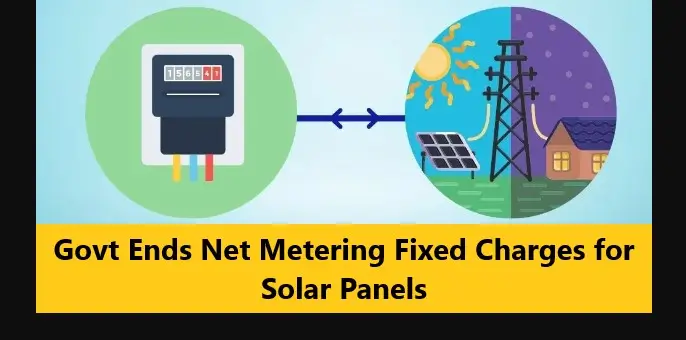Govt Ends Net Metering Fixed Charges for Solar Panels
Govt Ends Net Metering Fixed Charges for Solar Panels.
Prime Minister Shehbaz Sharif Directs New Tariffs for Solar Electricity
In a pivotal policy shift, Prime Minister Shehbaz Sharif has directed the federal government to overhaul the current solar energy framework, marking a significant change in how solar electricity is managed in Pakistan.
Read More: Punjab Free Solar Scheme 2024: Registration Process
This transformation includes ending the net metering system, introducing fixed monthly charges for solar users, and establishing distinct rates for buying and selling solar electricity.
Key Changes for Solar Energy Users:
1. End of Net Metering:
The government will discontinue the existing net metering system. Previously, this system allowed solar energy users to sell their surplus electricity back to the grid at the same rate they bought it. This change aims to create a more balanced and sustainable pricing structure for solar energy.
2. Introduction of Fixed Monthly Charges:
Solar system users will now face fixed monthly charges. This measure is designed to streamline costs and provide a more equitable approach to solar energy utilization, ensuring that all users contribute fairly to the maintenance of the energy infrastructure.
3. New Tariff Categories:
The government will introduce separate tariff categories for purchasing and selling solar electricity. This change reflects an effort to create a more sustainable and fair pricing model that can support the long-term growth of solar energy in Pakistan.
4. Establishment of a 600 MW Solar Power Plant:
In collaboration with Saudi Arabian investors, the government plans to establish a 600 MW solar power plant. This project is notable for its intergovernmental nature and exemption from the bidding process, highlighting a significant step towards increasing the country’s solar energy capacity and fostering international partnerships.
Government’s Commitment and Next Steps:
Prime Minister Shehbaz Sharif has instructed the relevant authorities to prepare a comprehensive summary of these decisions and submit it promptly. This directive underscores the government’s commitment to revamping the solar energy sector and promoting renewable energy sources as a cornerstone of Pakistan’s energy policy.
These forthcoming changes are poised to impact both current and future solar energy users, aiming to foster a more efficient, equitable, and sustainable energy system. Stakeholders are advised to stay informed and prepare to adapt to the new regulatory landscape.
By making these strategic adjustments, the government seeks to enhance the solar energy sector’s viability, ensuring that it continues to grow and contribute significantly to Pakistan’s energy needs. This policy shift reflects a broader vision of embracing renewable energy sources to achieve energy independence and environmental sustainability.
As the government moves forward with these plans, it is crucial for all stakeholders, including consumers, investors, and energy providers, to stay engaged and proactive in understanding and implementing the new regulations. This proactive approach will help ensure a smooth transition and the continued advancement of solar energy in Pakistan.
Note: The information above might not be accepted 100%. Please verify from your own sources. We will not be responsible for any kind of loss due to our content.
For more news, please visit Munafa Marketing.




